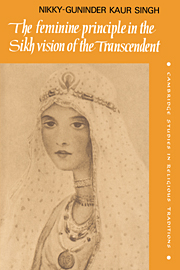Book contents
- Frontmatter
- Contents
- Preface
- Introduction
- 1 The Primal Paradox: seeing the Transcendent
- 2 Mother: the Infinite Matrix
- 3 The bride seeks her Groom: an epiphany of interconnections
- 4 Durgā recalled: transition from mythos to ethos
- 5 The maiden weaves: garlands of songs and waves
- 6 The woman asks: “What is life?”
- 7 Suṅdarī: the paradigm of Sikh ethics
- 8 Rāṇī Rāj Kaur: the mystical journey
- Conclusion
- Epilogue
- Notes
- Bibliography
- Index
5 - The maiden weaves: garlands of songs and waves
Published online by Cambridge University Press: 07 October 2009
- Frontmatter
- Contents
- Preface
- Introduction
- 1 The Primal Paradox: seeing the Transcendent
- 2 Mother: the Infinite Matrix
- 3 The bride seeks her Groom: an epiphany of interconnections
- 4 Durgā recalled: transition from mythos to ethos
- 5 The maiden weaves: garlands of songs and waves
- 6 The woman asks: “What is life?”
- 7 Suṅdarī: the paradigm of Sikh ethics
- 8 Rāṇī Rāj Kaur: the mystical journey
- Conclusion
- Epilogue
- Notes
- Bibliography
- Index
Summary
mere geet,
mere sāiāṅ!
tusāṅ laī gāe gae geet …
uṭṭhan taraṅgāṅ sāgaroṅ āē pauṅ vāṅgūṅ.
My songs,
My Beloved!
Songs sung for you …
The waves rise like wind from the ocean
I shall now focus on the works of a modern writer – Bhāī Vīr Singh (1872–1957). His writings clearly do not belong in the category of sacred scriptures. Nonetheless, they illumine a later age with insights derived from the holy writ. This is a big leap in time, but the intervening period proffers little creative or philosophical writing of any significance. The turmoil which overtook the Sikhs after the passing away of Gurū Gobind Singh in 1708 at once brought the dominance of heroism and restrained the profusion of learning. Gurū Gobind Singh's own epoch was anything but quiet; yet he had striven to preserve and enrich the literary tradition bequeathed to him by his spiritual predecessors. The elements of disturbance were to rule the day when he was no longer on the scene. It is for this reason that we encounter very little philosophical or scriptural exposition for most of the eighteenth century.
One new genre of Sikh writing which developed during this period was the rahitnāmā series. The rahitnāmās (from rahit,“conduct,” and nāmā, “manual”) were codes regulating Sikh practice and custom. They came to be composed in the name of Sikhs who had been close to Gurū Gobind Singh and were meant to carry the authority of the Gurū himself.
- Type
- Chapter
- Information
- The Feminine Principle in the Sikh Vision of the Transcendent , pp. 150 - 169Publisher: Cambridge University PressPrint publication year: 1993



